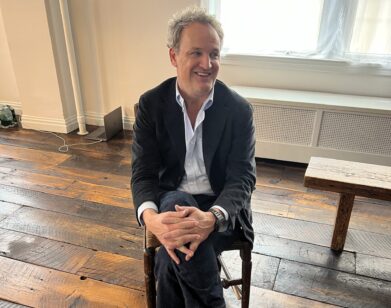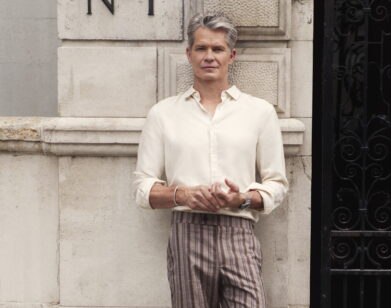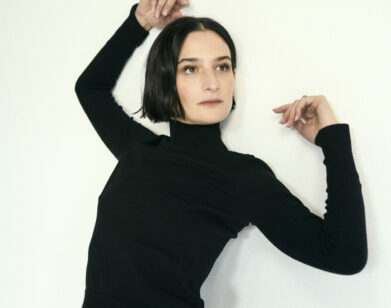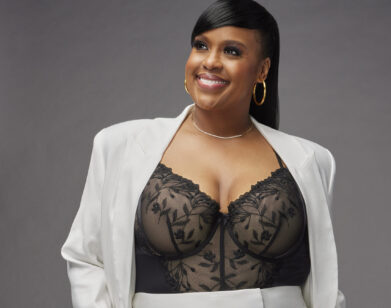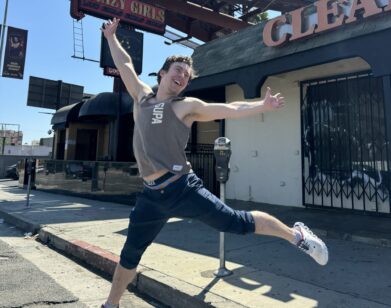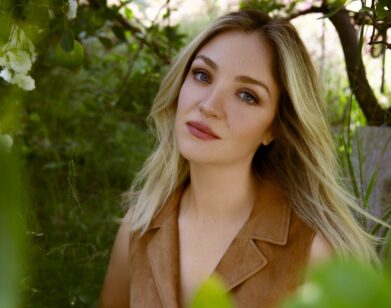SCREEN TIME
How Lauren Greenfield Captured the Reality of Growing Up Online in Social Studies
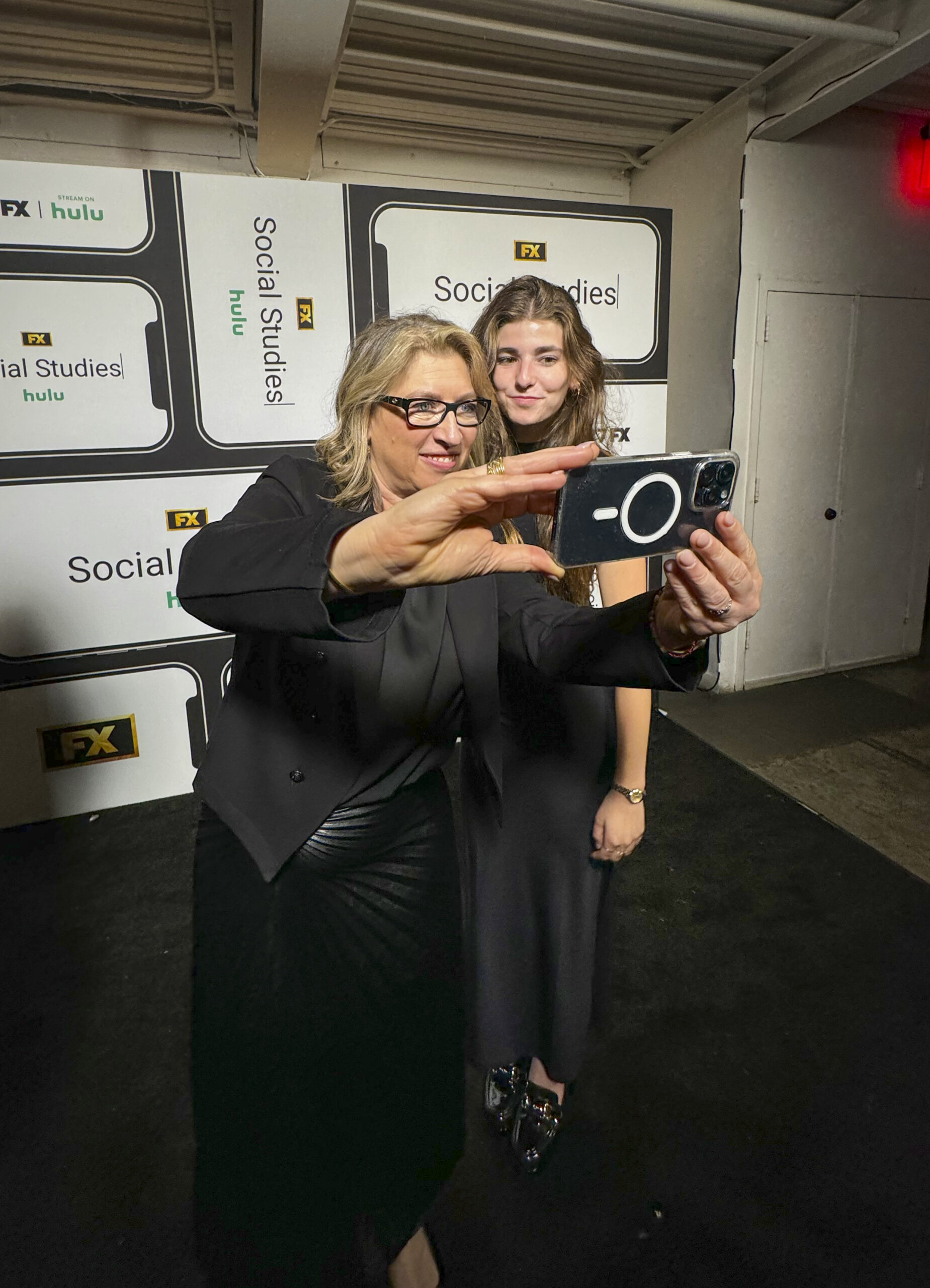
Master documentarian Lauren Greenfield’s new show Social Studies is a sobering window into the harsh realities of coming of age as a digital native. The five-part series follows an ensemble of high school seniors attending Palisades Charter as they navigate the obstacles of senior year–college applications, break-ups, body issues, peer pressure, and cratering relationships–while glued to their phones. Greenfield, best known for her groundbreaking photography book and the near bloodcurdling documentary Generation Wealth, managed to convince her Gen Z subjects to screen-record their phones non-stop, granting her a type of unrestricted access most filmmakers could only dream of. To mark the release of Social Studies, I met up with Greenfield for a mid-afternoon drink at the Roxy Cinema to discuss Instagram-face, “comparison culture,” and how her work inspired coming-of-age classics like Thirteen and Juno.
———
EMILY SANDSTROM: How has your trip to New York been?
LAUREN GREENFIELD: It’s been a bit of a whirlwind. Tonight’s our screening and then we’re going back tomorrow.
SANDSTROM: And you’re based in L.A.?
GREENFIELD: Yeah, I’ve been in L.A. for a while.
SANDSTROM: Cool. Well, I’ve been following your career for some time. I remember a friend had a copy of Generation Wealth laying around in her bedroom and I was like, “What the fuck is this?!” I got very deeply submerged into your universe some years ago.
GREENFIELD: Oh, good.
SANDSTROM: I had a chance to watch the new show. It really made me feel like… “thank god I’m not a teenager anymore.” The first thing I wanted to ask was, what kind of person do you think you would be if you had been raised a digital native?
GREENFIELD: I think I would’ve been really rocked with insecurity, because I was already very insecure and anxious. I already felt like I didn’t have the right clothes, like I needed to lose weight, and that I wanted to be like other kids. There’s a huge culture of comparison, which is so much harder for kids now. You’re not only comparing yourself to kids in your class or in your school, you’re comparing yourself against the kids across the entire world, many of whom are showing images that are manufactured or enhanced or retouched or Facetuned. I was the first person from my high school who went to Harvard. It was just an anomaly, it wasn’t what everybody was trying for then. Once I went to Harvard, I pursued arts, and I always found a certain freedom in that. But I definitely could not have hacked that now.

Still from Social Studies, courtesy of Hulu.
SANDSTROM: When they were all reading their admissions results, it really had me in a state. It’s so much to deal with, and fortunately I’d forgotten the feeling.
GREENFIELD: There are so many things that you go through as a teenager, and that’s been an interesting topic for me for a long time. My own high school years were very formative years for me. Fast Forward was about the insecurity and posing of kids, and how they were affected by image, celebrity, and materialism. Then I kept looking at those subjects in different ways, with Girl Culture and body insecurities. Generation Wealth was also about materialism and aspiration. So this project almost brings all that together, because social media just exacerbates all of it and makes it constant.
SANDSTROM: Right, but you’re pulling from a very specific demographic for this show. One of the things that got me the most was that the kids agreed to record their screens for you. I don’t think I could have done that.
GREENFIELD: Why couldn’t you do it now?
SANDSTROM: I don’t know. I’d likely be too paranoid. It was so cool that they let you.
GREENFIELD: They were very thoughtful about it. Kids are very media-savvy, it’s not like they didn’t know what they were doing. But they were brave and generous and decided that this was important and gradually let us in. In the beginning, they were curating a little bit more, not going on certain things when we were filming. But as we gained trust, and as they understood the intention more and more, they started to reveal more. So you get to really peek into what it’s actually like.
SANDSTROM: What qualities do you think you brought to this that made them feel so at ease?
GREENFIELD: We really became close. Sydney was just here in New York, I saw her yesterday. I feel like we’ve been through a journey together. As a documentarian, you get to live in this liminal space. You’re not a friend, not a parent, not a therapist; you’re like a repository of stories. A lot of the kids really wanted to tell their stories, and they understood that this was a serious study. It wasn’t reality TV or an influencer show or something. They didn’t treat our cameras like the phone; they treated it like we were doing this social experiment together, and they were serious about it too.
SANDSTROM: You could tell. They really understand how impacted they are and how weird this is. But it did sort of feel like reality TV in the sense that I was very hooked into their individual storylines.
GREENFIELD: Well, hooked is good, but fabricated is not good.
SANDSTROM: For sure. You’ve spoken about how you’re struck by the way American culture has transcended from Keeping up With the Joneses, or your neighbors, to Keeping Up With the Kardashians, AKA celebrities. Now, we’re keeping up with pretty much everyone you’ve ever met. With hindsight, do you feel like you’ve learned anything about how we can quell the effects of comparison culture for younger people?
GREENFIELD: It comes out at the end of the series, when I started thinking about how the antidote to comparison culture is being yourself. In a way I feel like this is not an issue doc, it’s more like a coming-of-age doc in the time of social media. The coming-of-age high school movie is where people find themselves, and that’s why it’s not depressing at the end, but strangely hopeful.
SANDSTROM: Right.
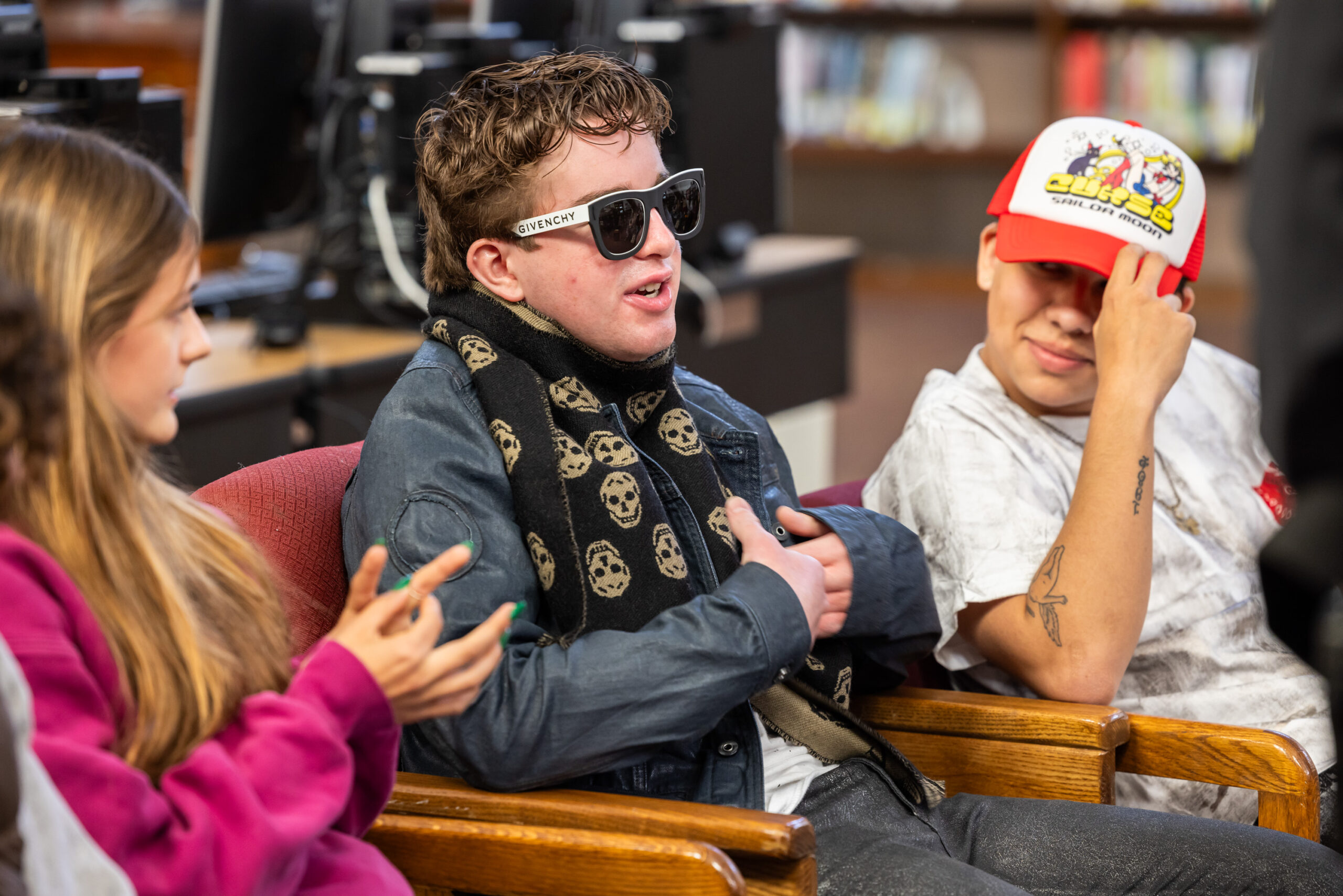
Still from Social Studies, courtesy of Hulu.
GREENFIELD: Because the kids do kind of find themselves, and then they have wisdom for us. And maybe this [social media] isn’t the way to express yourself, as Sydney says, and creativity is actually an answer. That was the case for me, although it took me way longer than a year. For me it was finding my voice as a photographer, as a filmmaker, and growing as an artist. That’s the antidote to, “I want to look like that.” I think it’s about self-expression, and that’s what we see with Sydney finding a way to make movies. For Jonathan, it was about being a listener, and then realizing that his own voice had value too.
SANDSTROM: When I was watching it, I was thinking about shows like Beverly Hills 90210, but also movies like Thirteen.
GREENFIELD: Oh, I love Thirteen. Actually, Thirteen is a funny full-circle thing because Catherine Hardwicke who directed it used my book Fast Forward on set.
SANDSTROM: Oh, really?
GREENFIELD: Yeah. There’s a scene where they’re doing drugs in the bathroom, which is straight out of my book. So she’s become a friend since then. I feel like I was a reference for her, so it’s funny that now she’s a reference.
SANDSTROM: I love that. People love that movie, younger kids are just now discovering it.
GREENFIELD: I also saw Jason Reitman at Telluride and I was like, “Ella’s introduction in her room felt a little Juno to me.” Then he was like, “I had your book when I was doing that. Everybody has your book who’s done teen movies.”
SANDSTROM: That’s so cool.
GREENFIELD: It was so sweet. For this, Euphoria was a reference. I thought it was unrealistic and slightly exploitative and sensational, but also really riveting. Some of the kids were really into it, which was intriguing. We ended up filming a bunch of people watching it, even though it didn’t end up in the show. There were some high school docs that were references, too: Nanette Burstein did American High, and Steve James did one. The idea of “a year in school” was kind of a trope, but I also wanted to mix that up a little bit by making it thematic for each one.
SANDSTROM: What shocked you the most while making this documentary?
GREENFIELD: A lot of things shocked me that had to do with scale. I knew that socials were a trigger for eating disorders, but I didn’t know that it was to the extent that every girl in our group had had some kind of experience with that. But I would say the specific thing that really shocked me was the BDSM trend with teenagers.
SANDSTROM: That was shocking to me, too.
GREENFIELD: Was it?
SANDSTROM: Truly.
GREENFIELD: Are you in your 20s?

Still from Social Studies, courtesy of Hulu.
SANDSTROM: I’m ’96, so I’m actually the cusp year between millennial and Gen Z, but I hadn’t heard about it. I mean, I remember stumbling upon pornography with other children when I was really young, but it wasn’t conversational. It was like, something to reckon with.
GREENFIELD: It also wasn’t aspirational.
SANDSTROM: No, it was like a horror movie.
GREENFIELD: I went home and talked to my boys about it and they totally validated it. They’re 18 and 24, and they were like, “We hear that’s what girls want, that’s what the imagery is.” When they were young, I remember talking to some of the moms who were telling me that their girls were shaving everything. And I remember thinking, “That’s from pornography.” I see that with my son’s cohort, they don’t like hair, and they don’t make that connection with pornography, but I do. I’m particularly sensitive to the hair thing, because my mom was a hippie that didn’t shave her pits and my sons think that’s the most disgusting thing ever.
SANDSTROM: Do you see really profound differences between your son who’s a digital native and the one who isn’t?
GREENFIELD: Yeah. My eldest son has more of an attention span than my youngest, and the youngest is more addicted to screens. In some ways he knows more about the world because he’s reading all the time from screens, but he doesn’t have as much self-directed focus. He’s also more concerned with what other people think, more self-conscious. His generation is very careful about what they post, and I think their biggest fear is being canceled. He’s more like the cohort that I documented. He didn’t get into the college he wanted and he was immediately looking at other people’s acceptances, devastated. My eldest is just more self-directed. He can just go read a book for eight hours, he’s a meditator, a little more off the grid.
SANDSTROM: One thing that came up, but not as much as I thought it would, is the Instagram-face phenomenon. I actually felt like the group of kids that you’re working with embraced their differences.
GREENFIELD: Yeah, they were a really naturally diverse group, which was nice. As the viewer, it’s great to see the diversity, but from the kid’s point of view they talked about feeling like they needed to look a certain way. The caucasian body type, being like, “Wouldn’t it be easier if I was just white?” That was a refrain that I heard a few times.
SANDSTROM: That was jarring.

Still from Social Studies, courtesy of Hulu.
GREENFIELD: Sophia talks about shaving because she wants to look like the white girls. Alex, as an Asian-American man says, “It seems like the only people getting likes are the buff Caucasian guys with the six packs.” Jonathan’s shaking his head when he says that. I don’t know that they feel so embraced all the time.
SANDSTROM: I’m realizing I don’t even know how you went about looking for subjects. How did you put out the call for participants?
GREENFIELD: In the Spring of 2021, I did almost 200 mini interviews with kids talking to them about social media, their experiences, how they were being affected, what they thought was important. Some of those kids ended up being in our group. Then I started meeting with them and filming and it grew organically. I met friends of theirs and siblings, and Jonathan introduced me to people he was working with at Teen Line.
SANDSTROM: Also, when did you establish your own production company?
GREENFIELD: So in 2015, I made Like a Girl and we started winning all of these awards, so I was going to different commercial awards events for the first time. I was like, “Woah, there are no female directors here.” Advertising is a really important media that impacts young people, and it’s important that female directors and female creatives be part of creating that media. It’s also really nice to be able to help other directors also grow. I think during Generation Wealth, I was really focused on my own work, my 25 years, my retrospective. And after that I was like, “Okay, what next?” So bringing up other voices has been very gratifying.
SANDSTROM: That’s awesome. What kind of reaction have you had so far to this show in particular?
GREENFIELD: Well, it comes out on Friday, but we showed it at the Telluride Film Festival and it was really great. They showed five hours at the festival and a lot of people stayed for the whole thing, which I was shocked by. But we’ve had a lot of interest because of the news cycle. People are really interested and concerned about this topic now, which is great. But at Telluride one programmer was like, “I wanted to tell you, I really like the craft. I know a lot of people are going to talk about it as an issue.” And that’s been true. But I hope that over time, people will also appreciate the craft, because I tried to do something that was fast and modern enough for teenagers, but also slow enough for parents so that they could really get into their world.

Still from Social Studies, courtesy of Hulu.
SANDSTROM: Well, as with all of your work, it didn’t feel didactic in any way. Is there anything that you really wanted people to take away from it?
GREENFIELD: Well, first of all, I’m glad that you didn’t feel like it was didactic because I’ve been doing press and everybody asks, “What do you want to do to solve the problem?”
SANDSTROM: And you’re like, “I’m not a doctor.”
GREENFIELD: Right. What’s most important is listening to the kids. Their voices are strong, and they do give us a roadmap. And there are things in the air that this will contribute to: getting rid of phones in schools, having more guardrails from tech companies. It would be great to see tech companies taking responsibility, maybe redesigning the algorithm so it’s not just taking people down a path that exploits their most sensitive vulnerabilities.

